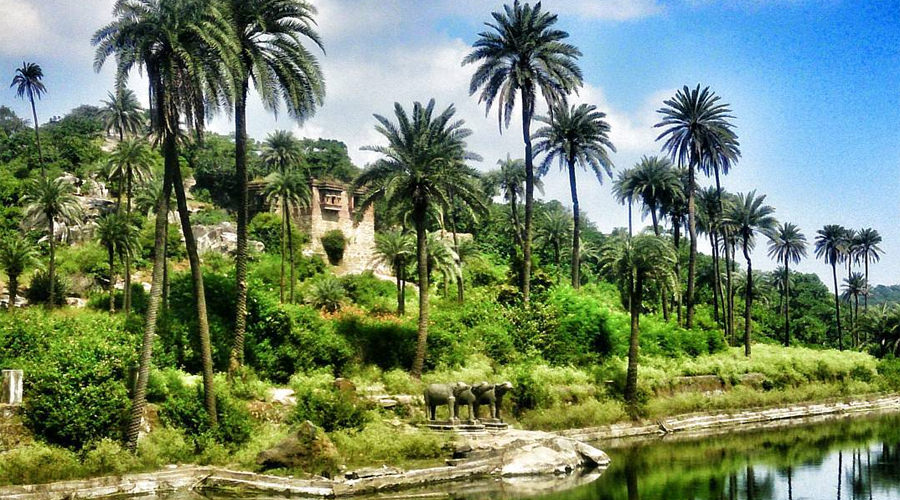Achalgarh fort situated about 11 kilometers north of Mount Abu, the only hill station in Rajasthan. The fort was originally built by the Paramara dynasty rulers and rebuilt, modernized and named as Achalgarh by Maharana Kumbha in 1452 one of the several forts built during his period in the rule. Achalgarh fort area is entirely surrounded by Mount Abu which is one of the most popular hill stations of North India. It is situated in the mostly desert state of Rajasthan and is often denoted by as an Oasis in the Desert.
The Achalgarh Fort was renovated and fortified by Maharaja Kumbha to escape pillagers. The Achaleswar Mahadeva Temple is nearby where a toe of Lord Shiva is worshipped.
You can find some Jain Temples inside the fort. The fort is in a run-down condition now. The first gate of the fort is known as Hanumanpol, which served as the entrance to the lower fort.
It comprises two towers built of large blocks of grey granite. After some ascent, stands Champa pol, the second gate of the fort, which served as the entrance to the inner fort.
The decayed Achalgarh fort is indeed a great architectural delight. There are some features of historical and religious importance in and around the fort.
Achaleshwar Mahadeva temple is just outside the fort; the toe of Lord Shiva is worshipped there and a brass Nandi is also located there. The famous Nandi containing is said to be made of 5 metals, fold, silver, copper, brass, and zinc.
The Nandi is made up of Panchadhattu and weighs more than 4 tons. There are also many other sculpted idols which are made of a crystal-like stone called static.
The temple is surrounded by the Mandakini Lake. This lake is surrounded by rocky hills, and rock walls covered with images of a Rajput king and buffaloes. Near the temple, there are three stone buffaloes standing around a pond which is said as demons in stories.
Achalgarh Fort is an impressive fort also with some beautiful Jain temples enclosed within. Among the important one is Kantinath Jain Temple.

Mount Abu to Achalgarh Fort: From the center of Mount Abu town take Delwara Road. At Shwetambar Jain Temple and Dharamshala, continue onto Dilwara Rd then continue on Oriya Road.
Then continue straight past Oriya Bus Stop onto Achalgadh Road and you will reach the Achalgarh Fort.
Achalgarh Fort Timings : 10:00 AM – 4:50 PM
Address:MDR 60, Mount Abu, Rajasthan 307501
Best time to Visit : August-March
An ancient fort called Achalgarh Fort is situated in Rajasthan, India's Aravalli Range. This building was constructed to safeguard the area and keep an eye on intruder movements.
Achalgarh Fort is situated in Rajasthan's Sirohi district close to the town of Mount Abu.
The Rajput king Rana Kumbha constructed it but The Paramara dynasty built Achalgarh Fort initially, but Rana Kumbha of Mewar restored, remodelled, and embellished it in 1452CE.
King Rana Kumbha of the Rajputs constructed Achalgarh Fort in the fourteenth century.
As one of the state's oldest forts and a site of numerous skirmishes and conflicts, Achalgarh Fort is a notable historical and cultural landmark in Rajasthan.
The Achaleshwar Mahadev Temple, the Kantinath Jain Temple, and the Mandakini Lake are three of Achalgarh Fort's top attractions.
From Mount Abu, one can go to Achalgarh Fort by automobile, taxi, or private vehicle.
Between October and March, when the weather is lovely and cool, is the ideal time to explore Achalgarh Fort.
Achalgarh Fort may normally be explored in 1-2 hours.
The Achalgarh Fort does not charge admission.
Although there is no set attire when visiting Achalgarh Fort, it is advised to dress modestly.
At the Achalgarh Fort, photography is not prohibited.
The answer is that it is safe to visit Achalgarh Fort, although tourists are urged to exercise caution and pay attention to their surroundings.
Yes, there are guided tours available for the Achalgarh Fort.
Yes, you can pay a price to hire a guide in Achalgarh Fort.
Certainly, there are numerous lodging options close to Achalgarh Fort.
Yes, there are a lot of eateries and food stands close to the Achalgarh Fort.
The Guru Shikhar Mountain, Nakki Lake, and the Dilwara Jain Temples are a few of the additional tourist destinations close to Achalgarh Fort.
Yes, you can go to Achalgarh Fort in the rainy season, but be aware that the weather might change quickly and the roads may get slick.
The name "Achalgarh," which translates as "the immovable fort," is thought to refer to the fort's impregnable construction and advantageous location in the Aravalli Range.

Leave a Reply